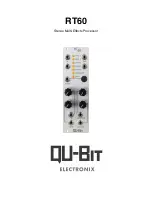
Register Descriptions
Section Four
GPIB-1014P User Manual
4-46
© National Instruments Corporation
Address Register 1 (ADR1)
VMEbus Address:
Base A F (hex)
Attributes:
Read Only
7
6
5
4
3
2
1
0
EOI
DT1
DL1
AD5-1
AD4-1
AD3-1
AD2-1
AD1-1
R
Address Register 1 (ADR1) indicates the status of the GPIB address and enable bits for the
secondary address of the TLC if mode 2 addressing is used, or the minor primary address of the
TLC if dual-primary addressing is used (modes 1 and 3). If mode 1 addressing is used and only a
single-primary address is needed, both the talk and listen addresses disable in this register. If mode
2 addressing is used, the talk and listen disable bits in this register must match those in ADR0.
Bit
Mnemonic
Description
7r
EOI
End or Identify Bit
EOI indicates the value of the GPIB EOI line latched when a data byte is
received by the TLC GPIB Acceptor Handshake (AH) function. If
EOI=1, the EOI line was asserted with the received byte. EOI is cleared
by pon or by using the Chip Reset auxiliary command.
6r
DT1
Disable Talker 1 Bit
If DT1 is set, the mode 2 secondary (or mode 1 and 3 minor.) Talker is
not enabled; that is, the TLC does not respond to a secondary address (or
minor primary talk address) formed from bits AD5-1 to AD1-1. If DT1
is cleared (DT1 = 0) and the TLC received its primary talk address (that
is, is in TPAS), the secondary address is checked.
5r
DL1
Disable Listener 1 Bit
If DL1=1, the mode 2 secondary (or mode 1 and 3 minor) listen function
is not enabled; that is, the TLC cannot be addressed to listen at the
address specified by AD5-1 through AD1-1. If DL1 is cleared
(DL1 = 0) and the TLC received its primary listen address (that is, is in
LPAS), the secondary address is checked.
4-0r
AD[5-1 – 1-1]
Mode 2 Secondary TLC GPIB Address Bits 5-1 through 1-1
These are the lower five bits of the TLC secondary or minor address.
The secondary address is formed by adding hex A0 to bits AD[5-1 –
1-1]. The minor talk address is formed by adding hex 40 to AD[5-1 – 1-
1], while the listen address is formed by adding a hex 20.
















































